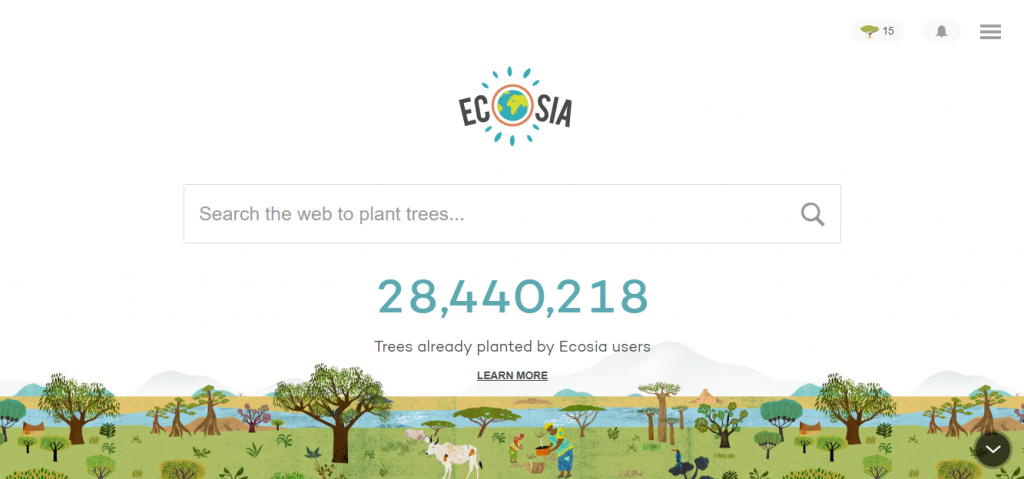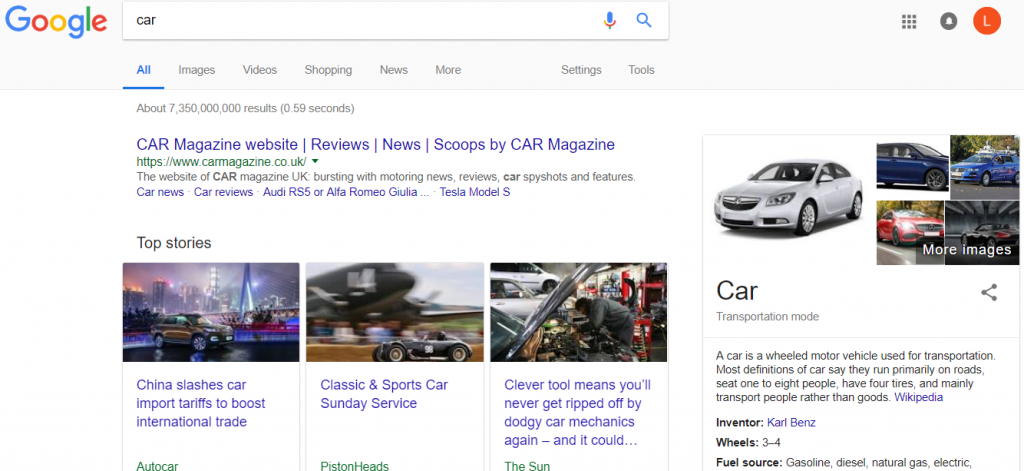In my recent research for alternatives to Google here at Search Engine Watch, Ecosia was one search engine that caught my eye.
The eco-friendly choice for search certainly seems to serve a purpose. We might forget it, but there is an environmental cost to our digital activities – including Googling.
So let’s dig a little deeper. Should we be more mindful of the effect our search queries are having on the environment and is Ecosia a viable alternative in a world where Google commands more than 90% of market share?
What is Ecosia?
Launched in 2009, Ecosia is a CO2-neutral search engine. With every search made, the social business uses the revenue generated to go towards its tree-planting scheme.
On average, 45 searches are needed to plant a single tree. Users can keep a tally of the number of searches they make thanks to a handy counter in the top corner of the Ecosia homepage.
Another ticker underneath the search bar boasts the collective number of trees planted by all Ecosia users, currently standing over 29 million trees.
Is Googling bad for the environment?
As more of our computing moves into the cloud, users are becoming increasingly aware of the environmental impact of day-to-day digital activities.
Journalists, artists and researchers are facilitating this awareness. Joana Moll is one such artist and researcher and created an online visualization CO2GLE shows the real-time amount of CO2 produced by the search giant.
The notion that search has an impact on the environment is not particularly surprising. But performing a search is such a quick and simple task that we don’t turn our thoughts to the pollution we’ve just caused.
When we can quantify and visualize what that impact is, we can really begin to process things. It’s amazing to see the CO2GLE ticker creep up to around 100,000 Kg in just a few minutes.
is that each search produces 10g CO2. This is down from Google’s own estimate in 2009 that each search produces around 20g. Estimates from other sources have varied too but what matters is that more people are making searches more often than ever before. And each search we make is a polluter.
How Ecosia compares with Google and Bing for usability
At first sight, Ecosia is very similar to Google. SERPs are delivered with blue links on a white background, green URLs appear alongside them, as well as short descriptions of each page.
Much of the engine itself is powered by Bing, although you need to make a search and scroll to the foot of the SERPs to discover this. Bing accounts for the ads that appear on the service, while both Bing and Ecosia have a part to play in the organic algorithm.
An example search for ‘car’ sees all the above-the-fold results on Ecosia being accounted for by ads (three in position 0 and three in the right-hand sidebar).
Interestingly, this is quite different to the SERPs allocation on Bing which reserves sponsored listings for the foot of the page and favours a rich knowledge graph on the right-hand side – far more similar to what we see on Google.
While Ecosia still uses Bing results and ads, it lags behind both Bing and Google for intuitive rich SERPs.
There’s something a little odd about using a search engine which is so environmentally virtuous, but which is also so ad-heavy. Although, with further searches made across all three engines the difference between ad quantity becomes less noticeable. That said, Ecosia still has some work to do in competing with Bing and Google’s rich features, such as ‘Shop for…’ image packs when focusing in on sponsored results alone.
Is it helping make Google cleaner?
Thanks to competitors such as Ecosia, it puts increased pressure on Google to keep its environmental cost in check. In 2016 Google celebrated their tenth year of being carbon neutral. They also announced they would buy enough renewable energy in 2017 to match 100% of their global consumption for operations.
Environmental concerns and sustainability are touted as core values for the search giant. Their most recent Environmental Report also highlights the market-leading efficiency of Google data centers, proclaiming: ‘on average, a Google data center uses 50% less energy than a typical data center.’
It seems that Google has been proactive in improving its environmental impact since before the launch of Ecosia. It has also been increasingly transparent as writers and researchers have become more probing about the environmental impact of data.
Google’s self-reflection on its carbon footprint and efficiency should be lauded – but perhaps where competitors like Ecosia and tools like CO2GLE are important are in highlighting the environmental impact of searches and search users, rather than the impact of the businesses running the engines.
Is Ecosia a viable competitor?
Users aren’t going to get as rich and efficient a search experience using Ecosia compared to Google or even Bing. But, arguably, its differences aren’t massively noticeable to the casual user – particularly if that user is used to seeing ads and not too familiar with the plethora of rich features Google increasingly offers.
In terms of hard market share, Ecosia doesn’t make a dent in global terms. Nor even can it be seen to take a chunk of things in its domestic market Germany where Google, Bing, Yahoo!, DuckDuckGo, t-online and Yandex are all favoured by users, figures by StatCounter have shown.
While it might be tempting to think Ecosia’s user base is tiny, the company itself boasts of having more than 7m active users – a number which is not to overlooked.
Promoting the collective impact of searches, searchers and search engines
Ecosia succeeds in reminding its users that curbing the environmental cost of data and digital activities is not the sole responsibility of search engines.
Google are, in business terms, getting better at improving their efficiency and being transparent about their environmental impact. But it is not obvious to Google’s users, when they are making searches, what the cost of those searches are.
This could be a positive next step for Google. Although tree-planting wouldn’t necessarily be feasible at Google’s scale and a simple ticker akin to CO2GLE would risk deterring users, there is an opportunity for the engine to make each search a positive for the environment rather than a negative.
That Ecosia still exists in relative obscurity nearly a full decade since its launch may be surprising to some users, but it does provide a functional tool to turn digital activity into positive real-world action. It still does a good job in highlighting the steps we need to take as individuals, and collectively, to counter the environmental impact of our digital lives.




